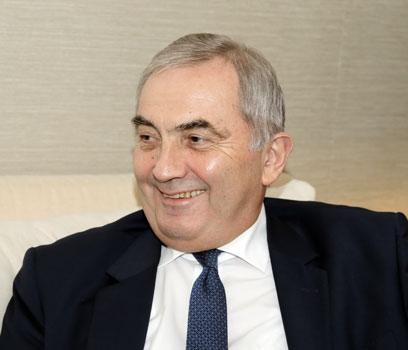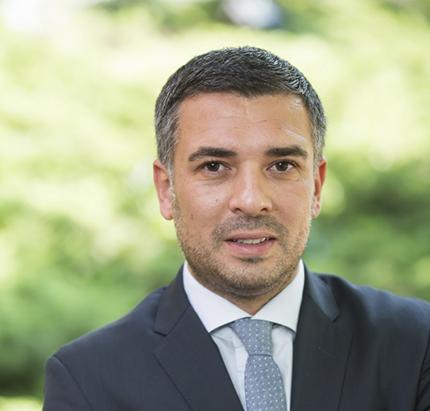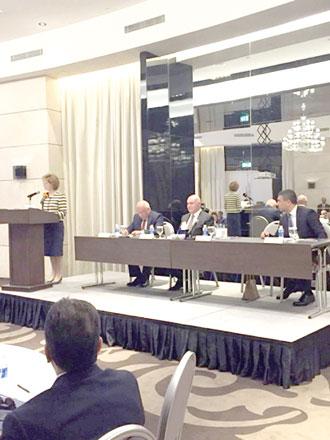You are here
Romania sees immense potential to upgrade relations with Jordan
By Ica Wahbeh - Nov 17,2016 - Last updated at Nov 17,2016

Lazar Comanescu
AMMAN — In Jordan for a one-day visit during which he met with his counterpart Nasser Judeh, Romanian Minister of Foreign Affairs Lazar Comanescu said on Wednesday his country is committed to "enhancing cooperation with one of its best friends among the Arab nations".
In an interview with The Jordan Times, the minister, who also held discussions with Deputy Prime Minister for Economic Affairs and Minister of State for Investment Affairs Jawad Anani, and Senate President Faisal Fayez, said: "We must use the advantages of both our countries, the tremendous opportunities of cooperation; given that, together, we have an immense potential of expertise, manpower and capital, allowing us to successfully bid for common projects."
Deeming trade as "the very basis of the development of inter-state relations", the foreign minister "encouraged the Romanian business community to take advantage of my visit in Jordan" because "direct contacts are a very useful instrument for the development of a sustainable partnership".
As such, accompanying him on his visit was Romanian President of the Chamber of Commerce and Industry Mihai Daraban, who signed a memorandum of understanding with Jordan Chamber of Commerce.
The main Romanian exports to Jordan consist of agricultural products, but economic cooperation should expand, said the minister, to include more fields, such as "information technology and communications, alimentary products, construction materials, as well as resources for the design and construction of infrastructure projects... and tourism".
The commercial balance is strongly in favour of Romania, "which is why we are willing to work with the Jordanian authorities and the business community in order to identify the most suitable ways for promoting [Jordanian] exports to the Romanian market".
Relations between the two countries go back 41 years, during which time, about 12,000 Jordanians studied in Romania.
"Cooperation in the field of education, as well as culture, is one of the most effective tools in bringing our societies together," said Comanescu.
As such, Romania grants scholarships and offers Jordanians the opportunity to study at Romanian universities.
"By further developing joint cultural, scientific and academic projects between Romania and the Hashemite Kingdom of Jordan, we shall enhance the mutual trust and friendship, and lay down an even stronger foundation for bringing our nations together."
To be able to travel to Romania, Jordanians need to follow the same EU visa requirements, he noted.
"However, Romanian authorities constantly seek appropriate ways to relax visa policy and the corresponding legal framework in order to facilitate travel and visa granting for Jordanian nationals, one example being that our country recognises as national visas both Schengen visas and residence permits, as well as those issued by Cyprus, Croatia and Bulgaria."
Cooperation between Jordan and Romania goes beyond commerce and education, according to the top diplomat.
As the entire international community is facing security challenges and “unconventional threats such as terrorism, migration and radicalisation”, the minister stressed the need for dialogue and cooperation, for a joint review of “our methods and instruments in order to turn [challenges] into as many opportunities”.
“The need for dialogue and cooperation is best exemplified in the partnerships between the European Union and the Hashemite Kingdom of Jordan. In the region, Jordan is a beacon of stability... [an] achievement, along with many others, [that] is a direct result of the wise policy of His Majesty King Abdullah, a true visionary leader who, on many occasions, rightly anticipated political and security developments”.
Commitment to fostering peace, stability and prosperity, and to fighting terrorism has prompted Romania, like Jordan, to join the efforts of the international community to confront threats, including the international coalition against terrorism.
Addressing the phenomenon of radicalisation in the Middle East, he said that Romania’s position is that “Muslims are our friends and partners! Like all the other innocent people, Muslims are also victims of a distortion of a religious cult and it is of utmost importance that we work together to fight against Islamophobia and extremism. In addition, we need to address not only the consequences, but also the root causes of terrorism. Preventing radicalisation is key in this regard, especially within the communities most vulnerable to radicalisation and recruitment [by terrorist organisations].”
In an interdependent world, “the challenges that we are facing in the Middle East, such as the situation in Syria, Iraq, Yemen or the Israeli-Palestinian conflict, have a strong impact on the security and economic stability not only of the region, but of the whole planet”, said the minister, stressing that Romania “is an active promoter of the peaceful settlement of conflicts, supporting a policy of dialogue and negotiation”.
Military solutions cannot lead to the defusing of conflicts, said Comanescu, referring to Syria and Libya; in Iraq, central authorities need to implement governmental reforms with the purpose of ensuring peace and stability; and in the Israeli-Palestinian conflict “Romania supports the two-state solution and is ready to make best use of its resources in order to contribute to the resumption of the peace process”.
Related Articles
AMMAN — Jordan represents a key partner for Romania in the Middle East, a constant factor of balance and moderation and a strategic nexus co
AMMAN — Over 100 Jordanian and Romanian companies on Monday gathered in Amman to discuss ways to enhance bilateral economic ties and strengt
AMMAN — Hashemite University President Kamal Bani Hani met with Prince Radu of Romania and an accompanying higher education delegation, the


















